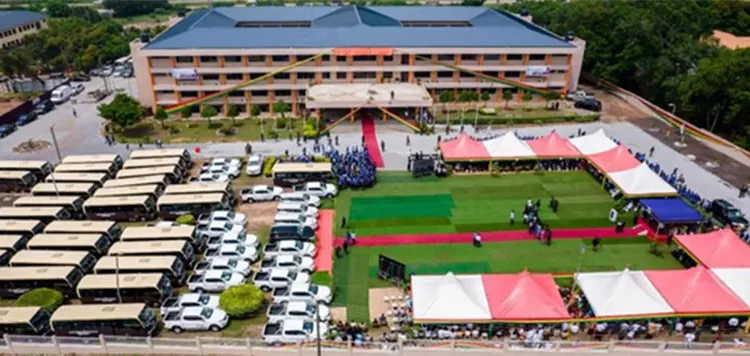Aerial view of one of the TVET buildings
ENROLLMENT AT Ghana’s Technical and Vocational Education and Training (TVET) institutions has risen dramatically from 25,091 students in 2020 to 73,434 in 2024 due to collaborative initiative between Planet One Group and the Ministry of Education.
Chairman of Planet One Group, Mr. Sanjeev Mansotra, in a statement, said the first phase of the TVET transformation initiative saw the modernisation of 38 national vocational training institutions, established two new foundry and machining centres, and upgraded the Opportunities Industrialisation Centre in Accra.
The initiative also witnessed the enhancing of infrastructure, including hostels, classrooms, ICT labs, workshops, and industrial-grade equipment, expanded capacity and made TVET accessible to students from both urban and rural communities.
He stated that nearly 700 teachers and trainers have received up-to-date training, while new curricula have been introduced to align with Ghana’s industrial growth needs across 28 trades, including sectors vital to the country’s economic development.
According to Mr. Mansotra,Planet One Group is also collaborating with the Ministry of Education to develop state-of-the-art TVET centres across the country, aninitiative aimed at further transforming Ghana’s vocational education landscape and strengthening the broader ecosystem.
Mr. Mansotradisclosed that the continued development of Ghana’s vocational education system is essential for the nation’s progress.
“The transformation underway in Ghana’s TVET sector is enabling the country to tap into the vast potential of its people and laying the groundwork for a more inclusive and prosperous future. The remarkable surge in enrollment reflects the aspirations of Ghana’s next generation and underscores the power of a holistic approach to education,” he said.
He added that vocational education was once viewed as a less attractive alternative to university, saying, the initiative has removed barriers to access and created an aspirational environment for young people, including women who were previously underrepresented.
He stated that TVET is currently recognised as a gateway to opportunity, equipping students with practical skills and digital literacy for employment and entrepreneurship in key industries.
Mr. Mansotra also indicated that phase two of the initiative, now underway, will further expand and modernise vocational training at the polytechnic level, introducing advanced workshops and laboratories to meet the demands of Ghana’s evolving economy.
“As new graduates step into key industries, the positive impact of the government’s efforts will resonate throughout the Ghanaian economy, advancing national goals for industrialisation and inclusive growth. The ongoing transformation of Ghana’s vocational education system is opening doors for the next generation and laying the groundwork for sustained prosperity,” concluded Mr. Sanjeev Mansotra.
BY Prince FiifiYorke


